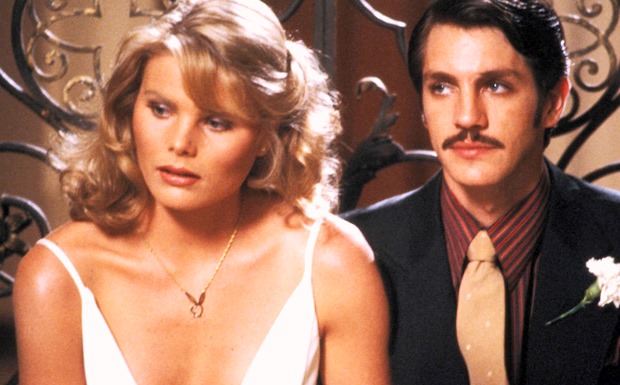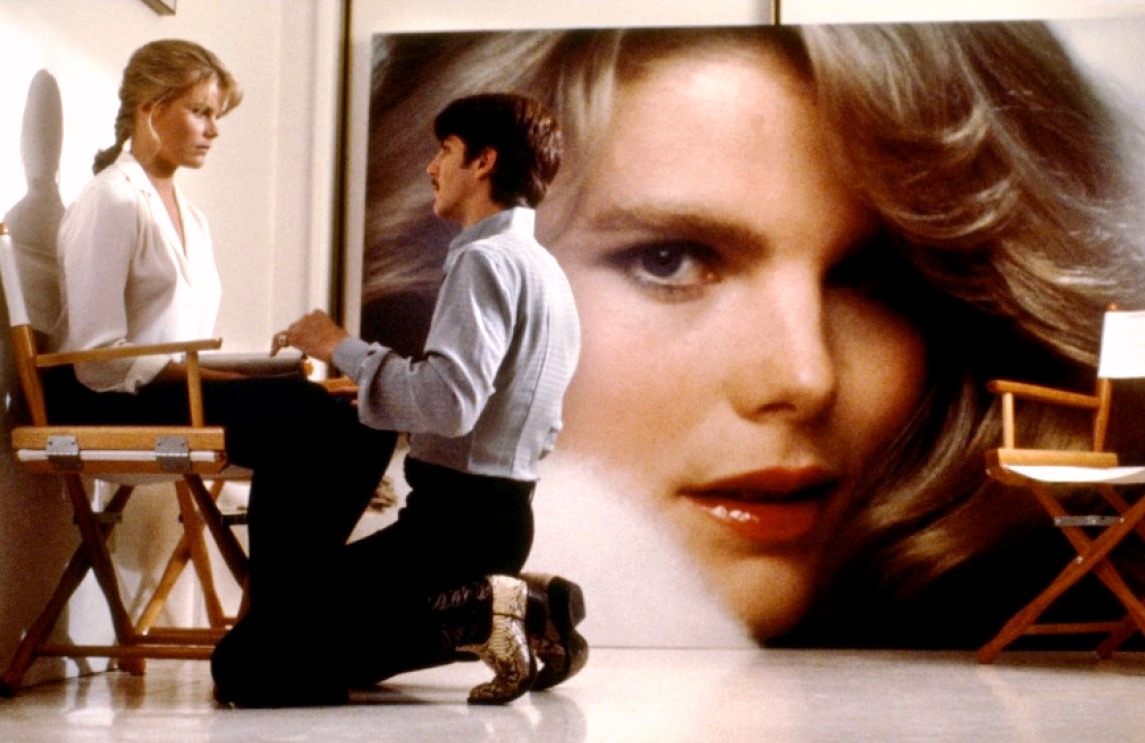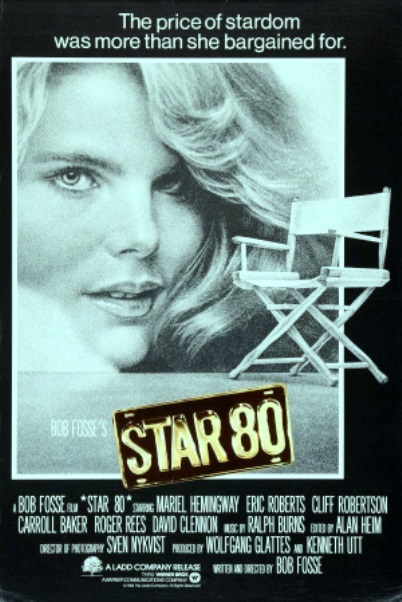
<blockquote><em>“Our society has put hate above love, favored killing over living.”</em> – Paul Snider quoting Hugh Hefner</blockquote>
Sometimes you cross a film that has such an unmistakable instinct for the truth of human behavior that you realize how phony so many other films are in comparison. There is good behavior, there is bad behavior, there is evil behavior, but here is a film that captures what people in the shadows really do, how they really act. An invigorating pulse is apparent here that is missing from most movies we do seee
This is maybe the saddest film ever made, but people out there who care about great art and profound messages should find this essential viewing. Bob Fosse’s <em>Star 80</em> is the true story of the brutal murder-suicide of Playboy Playmate Dorothy Stratten by her sick, manipulative and controlling husband Paul Snider. Stratten (Mariel Hemingway) was a humble girl from Vancouver, British Colombia who worked at a Dairy Queen at age 17, Paul Snider (Eric Roberts) was a hustler, club promoter and sometimes pimp who discovered her. To get Stratten into Playboy would mean to catapult Snider’s own lifestyle too – his way to get himself into the in-crowd. Hugh Hefner, the uber-famous Playboy publisher, would be one of many to find Snider to be too sleazy. Stratten would marry Snider (it is treated as an arbitrary development in this narrative as to suggest there was never true love omnipresent in the first place), become quickly estranged from him, made efforts to break it off cleanly, and ended up dead.
Snider ultimately didn’t have the same class to belong to the new world that Stratten became accustomed to. His narcissism and jealousy was suffocating, at one moment encouraging Stratten’s new film career and then accusing her of sleeping with the director. He would try and fail to make money in sordid businesses, alternately attempted to insinuate himself into the Playboy Mansion life only to be curtly shut out of it. Dorothy was sweet and naïve, but all too tolerant of incessant verbal abuse from her husband. She felt she owed him pity. And money. Friends tried convincing Dorothy she didn’t owe her husband any of this. Dorothy should have listened.
The film makes it clear from the beginning that it will end in murder. This allows us to see and dissect the strands of sociopathic behavior in Snider from the start. By Fosse structuring the film as a flashback, we engage the film as a fascinating and despairing character study the entire way. Snider is snooty and big-talking full of promises, but sniveling and parasitical all the same. One scene is unforgettably embarrassing: Snider meets a TV actor named Vince Roberts at a Playboy party, and the sycophancy of Snider idolizing him and yet insulting his career is a case of his most horrible manners.
Eric Roberts, the real-life brother of Julia Roberts, gave one of the most unheralded great performances of all-time as the egotistical, remorseless Snider. I always had the feeling that Eric never became a bigger star, like a character actor like Hoffman or DeNiro, because he was <em>too good</em> in this film – he was smutty and scary in a way that made you not be able to imagine him in an alternate normal role.
As for Hemingway, she is simply pristine in terms of beauty, and demonstrates vulnerability and kindness through and through. Hemingway infuses the essence of Stratten and Playmates, capturing the “girl next door… fresh and young and naïve.” At the time, Hemingway got breast implants before shooting the film, but denied that she got them for the role at all. I heard, later on, from somewhere that Hemingway felt <em>Star 80</em> was the role of a lifetime and felt the boob job was necessary to do the role right. As for me, I always felt Hemingway did just right, i.e., everything right, with her doing pitch-perfect vocal intonations of a young girl transforming into a rising star. Hemingway is lit up from within when she is treated like a star, treated as important — it does not even matter what she is famous for or perceived as (an ideal sex object), what invigorates her is that she is seen, idolized, given special treatment as a star. That lends any human being a kind of euphoria, and even an invincibility factor, that can distort reality. Dorothy is blindsighted by fame to the point she does not fully digest the menacing situation she is in with Snider. Hemingway, with all of this, is luminous in catching these shades of behavior.
 <em>Star 80</em> would be the final film of Bob Fosse who died four years later of a heart attack. He is in my mind the most underrated film director of all-time. He only made five films, though had he made more he would be more revered as a filmmaker. See all that exist: “Sweet Charity” (1969), “Cabaret” (1972), “Lenny” (1974) and my personal favorite “All That Jazz” (1979). Fosse was already a great Broadway choreographer before he turned passionately into filmmaking. He was nominated three times for Best Director (won for “Cabaret”), but was overlooked for <em>Star 80.</em> He was a genius at the creative image, used film as a way to explore the psyches of entertainers, found a way to depict obsessive-compulsiveness of its characters by mirroring them with his editing style, and brought an unparalleled sophistication to sordid material.
<em>Star 80</em> would be the final film of Bob Fosse who died four years later of a heart attack. He is in my mind the most underrated film director of all-time. He only made five films, though had he made more he would be more revered as a filmmaker. See all that exist: “Sweet Charity” (1969), “Cabaret” (1972), “Lenny” (1974) and my personal favorite “All That Jazz” (1979). Fosse was already a great Broadway choreographer before he turned passionately into filmmaking. He was nominated three times for Best Director (won for “Cabaret”), but was overlooked for <em>Star 80.</em> He was a genius at the creative image, used film as a way to explore the psyches of entertainers, found a way to depict obsessive-compulsiveness of its characters by mirroring them with his editing style, and brought an unparalleled sophistication to sordid material.
I want to mention a few other things about the film. Hugh Hefner was displeased with his portrayal by Cliff Robertson, but Hefner is impossible to portray anyway, isn’t he? Hefner is one of the most oddly benevolent on the surface (yet passive aggressive in his dominance of others) of all legendary controversial figures of the past century. Robertson gives a placid as well as astute interpretation, if anything, of Hefner and so it’s hard to even be offended by the portrayal. Aram Nicholas (played by Roger Rees), the director that the movie Stratten becomes involved with as she withdraws from Snider, is a fictional re-creation of her relationship with director Peter Bogdanovich. “They All Laughed” (1981) was the actual film that Stratten was shooting for Bogdanovich, a good film according to me.
Finally, the drawn-out murder-suicide scene at the end is recreated at the actual house where the incident took place. The film implies he forced her to have sex, taunted her before shooting her brains out with his shotgun, had sex with her corpse on a bench apparatus designed for deep penetration, and finally howled and moaned for a couple of hours before turning the gun on himself. All could have been prevented if Dorothy had walked out of the house the minute Snider was behaving he was ready for violence. Or prevented if she never had felt she owed him time alone to see him at all. A woman should not feel she owes an abusive man anything.
I take it back that <em>Star 80</em> is the saddest thing you can see. It is actually more accurate to call it the most depressing of film experiences. But a masterpiece I think it is. If you are one that has been drawn-in to the wrong types of scheming and dangerous people in your life then you owe it to yourself to see this film. Even if you have to close your eyes for some of it.
103 Minutes. Rated R.
DRAMA / WINTER DESPAIR / MASTERPIECE VIEWING
Film Cousins: “Lenny” (1974); “Taxi Driver” (1976); “Death of a Centerfold: The Dorothy Stratten Story” (1981); “The Notorious Bettie Page” (2006); “Lovelace” (2013).





